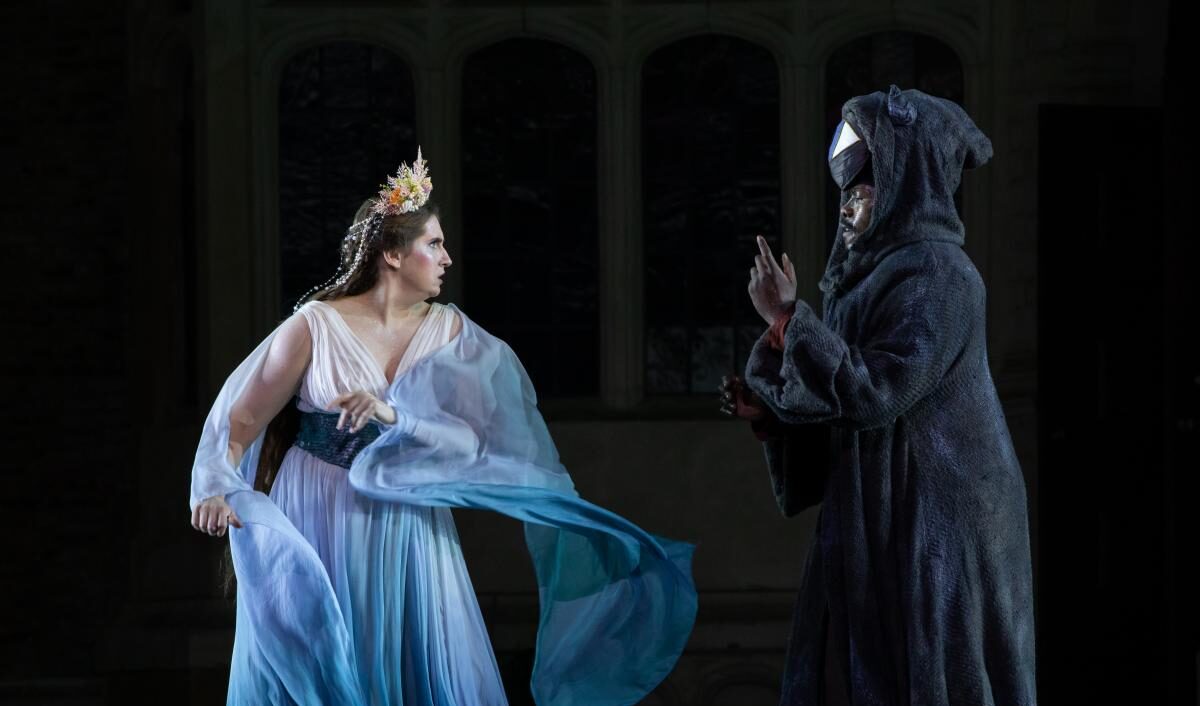First performed in 1718, when Handel was still a relative newcomer to British cultural life, Acis and Galatea is an ‘almost opera’. There is a minimal story and some glorious music – its origins as an after-dinner entertainment for the guests of fraudster-turned-patron-of-the-arts (sounds familiar?), the Duke of Chandos, are all too evident in the flimsy drama. But in the hands of an inventive director like Louise Bakker the blank canvas can be decorated in all sorts of ways and the eighteenth century conventions can be revitalised with a twenty first century imagination. This sort of modernising is not to everyone’s taste but this Holland Park version hits enough targets for me – and I can’t help feeling that, if he was still around, Handel the impresario would have approved too.
Galatea, the nymph, loves Acis, the handsome shepherd. His friend Damon warns him that loving an immortal has its downside. They frolic in the pastoral landscape, supported by spirits and shepherds, and eventually consummate their love. Unfortunately this enrages the cyclops, Polyphemus, who has a passion for the nymph himself. After some spectacularly unsuccessful wooing on his part, he turns to violence and kills Acis. The heartbroken Galatea uses her magic powers to turn Acis into a spring which gushes forth cool clear water. The end.
Director Louise Bakker understandably decides not to treat this story with any respect and goes for a comic approach. The impressive choral ensemble – who play spirits, shepherds, and even sheep – sometimes seem like the artisans from a Shakespeare comedy and, on one occasion, reminded me of the dancers from Michael Jackson’s Thriller. But whatever fun they are having with the story, they sing the music with both style and fluency.
And amid this mayhem, the four solo singers stay true to the beauty of Handel’s music. Elizabeth Karani is a splendid Galatea. She has a flexible and warm soprano voice ideally suited to the arias of flirtation and seduction of the role and she brings a dignity to the lovely aria “Heart, the seat of soft delight” as she creates the spring in memory of her lost love. As Acis, Anthony Gregory does his best with a role that is not quite either hero nor lover. His melodious tenor fits the bill for a Handel-ian lead but he never quite convinces as the object of Galatea’s infatuation. Chuma Sijeqa is a ripely comic Polyphemus but I can’t help wondering what the second act might have become if he was just a little bit frightening… and the bizarre giant costume with its comedy single eye didn’t help. The role of Damon, Acis’ friend and confidant, is sung by Ruairi Bowen, a Handel specialist, and he conjures some lovely moments from an under-written part.
Michael Papadopoulos conducts a very small ensemble of players drawn from the City of London Sinfonia and captures the sound world of early eighteenth century opera in all sorts of ways – Ashok Gupta’s work on the harpsichord was particularly telling.
I am still not convinced that the layout of the performance space at Holland Park gives singers the opportunity to produce their best. In particular, when singers are at the back of the stage behind the orchestra they can sound swamped. Opera in the early 1800s thrived on two things – star singers and visual effects. This production gave us some very fine singing and lots of inventive visual jokes. As Opera Holland Park’s first foray into Handel there is a lot to commend this production. I hope they head towards the darker end of the range very soon.
Composer: George Frideric Handel
Librettists: John Gay and Alexander Pope
Conductor: Michael Papadopoulos
Director: Louise Bakker
Performers incl: Anthony Gregory, Elizabeth Karani, Chuma Sijeqa, Ruairi Bowen
Running time: 2 hrs 15 Mins
Dates: until 2 August
Photo credits: Ali Wright

